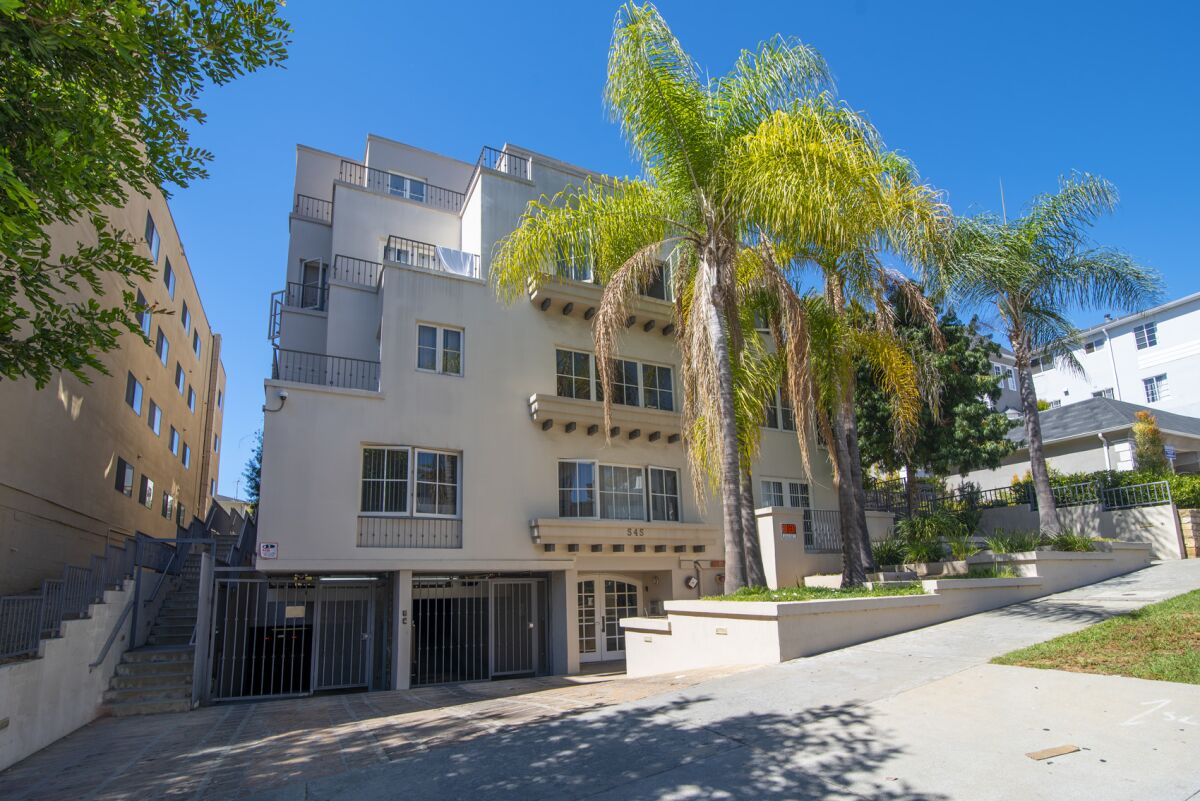In the days before Los Angeles’ “mansion tax” took effect, the luxury market moved at hyperspeed.
Prices were slashed, escrows were rushed and million-dollar deals were closed as panicked sellers offered exotic cars and lucrative bonuses to anyone willing to buy their properties by the end of March. It was a manic, desperate attempt at avoiding Measure ULA, a new transfer tax that levies a 4% charge on all residential and commercial sales in the city above $5 million and a 5.5% charge on sales above $10 million.
On April 1, everything froze.
Sellers, now faced with paying the tax if they sold, yanked their properties off the market. Discounted prices, which were valid only if the deal was done by March, shot back up. The luxury goodies were off the table. Bye bye, Bentley.
A market slowdown was expected, but the night-and-day difference between March and April sales was unprecedented.
In March, when the luxury market reached the peak of its frenzy, there were 126 home and condo sales above of $5 million in the city of L.A., according to the Multiple Listing Service.

This Brentwood mansion sold days before Measure ULA took effect, avoiding a tax bill of $891,000 that would’ve gone toward housing and homelessness efforts.
(Noel Kleinman)
In April, once Measure ULA took effect, there were two.
One sold in Brentwood for $5.7 million, and the other traded hands in Venice for $7.5 million. Together, they raised $528,000 for the city to use for affordable housing and homelessness prevention programs. So far, that’s it.
The slowdown makes sense. Sellers were economically incentivized to close deals before they would have to pay the tax, so most of the sales that were going to close already closed. L.A.’s luxury market won’t remain frozen forever, and deals will eventually pick back up, especially once the courts rule on two lawsuits arguing that the tax is unconstitutional. Many sellers are holding off listing while they wait for a clear ruling one way or the other.
But for a city grappling with a housing crisis, funding is needed as quickly as possible, and early signs indicate that the once-lofty projections for how much Measure ULA would raise might be much, much lower — especially for the first few months.
When Measure ULA was on the ballot in November, proponents estimated it would generate roughly $900 million per year, based on real estate sales data from 2021 to 2022.
In March, a report from the City Administrative Office lowered that number significantly, projecting $672 million in revenue from July 2023 to June 2024. The projection was a response to a real estate market that slowed dramatically due to rising interest rates.
Then in April, Mayor Karen Bass unveiled her first budget proposal, a $13.1-billion plan that included $1.3 billion to address homelessness. However, the budget only projected $150 million in revenue from Measure ULA.
The city is walking a tightrope. It needs to spend as much as possible to address housing and homelessness, but if the courts decide the measure is unconstitutional, the city will have to pay back all the money it generated from the tax. An L.A. County judge recently consolidated the two lawsuits challenging the measure into a single case, but the timeline for a ruling is unclear.
In this legal limbo, the city had to choose a budget number big enough to make an impact but small enough to pay back if necessary. The planners landed on $150 million because they felt confident that the city could make that back through federal reimbursements from organizations.
“The $150-million number takes into account the risk of losing litigation, but it’s also reflective of the urgency of the housing and homelessness situation,” said Greg Good, a senior advisor on policy and external affairs for the Los Angeles Housing Department. “This is an amount we feel comfortable that we could refund, if necessary.”
Good added that the ULA money can only be spent as it comes in, meaning that the city won’t be able to use the $150 million until the tax generates $150 million.
If luxury sales stay at the pace they are right now, that may take a while.
“We anticipated the market slowing down. It’s logical economic behavior,” Good said. “But it’s still real estate in L.A. Eventually, transactions will get back to normal.”
Sellers are sitting on the sidelines in hopes that the tax will be overturned. The Howard Jarvis Taxpayers Assn., one of the groups filing a lawsuit against the tax, published a page on its website with instructions on how to file for a refund if the suit is successful.
“Sellers are taking their properties off the market, and there are some developers who won’t buy anything in the city,” said Compass agent Sally Forster Jones. “There’s hope that it gets overturned.”
Jones handled one of the final sales before Measure ULA took effect, helping a client sell a 1930s mansion in Brentwood for $16.2 million. Since it sold before the deadline, the seller saved $891,000.
The commercial market has cooled as well, according to Oron Maher of Maher Commercial Realty. He said that most sellers listing properties post-ULA will be the ones that have no choice.
“These are mom-and-pop owners of real estate. People going through death, divorce, partnership dissolutions or retirement who are forced to sell as soon as possible,” Maher said. “If you don’t need to sell in ULA, you won’t. This will be a tax on people already experiencing difficult situations.”
In the last days of March, Maher closed the sale of a 16,000-square-foot apartment building on behalf of an elderly client who chose taking a lesser price over paying the tax. At $11 million, the sale price was $1.5 million less than the asking price, but it avoided a tax bill of $605,000.

This 16,000-square-foot apartment building sold for $11 million on March 31.
(Mano Handian / Lights Camera Location)
Maher said that over the past month negotiations have become a game of hot potato, with sellers and buyers both asking the other to cover the tax.
“Buyers are saying it’s a seller’s tax, but sellers are saying they can’t sell unless the buyer can raise the price,” he said. “It’s all leading to less transactions.”
Even if the measure is upheld in court, there’s a chance sellers will find ways to skirt the tax. Shortly after the measure passed, The Times reported that wealthy sellers were already eyeing ways to avoid paying, such as breaking properties into pieces and selling them separately.
Legal resource outlet JD Supra recently published an article headlined “Nine Ideas to Avoid the Effect of Measure ULA.” Its suggestions include selling stakes in the entity that owns a property rather than the property itself, selling a house and the land it occupies separately, or taking the broker’s fee out of the sale price to get it under the tax thresholds.
City officials, meanwhile, are beefing up staff to help manage and administer the tax. The Los Angeles Housing Department is requesting six new hires to help launch ULA spending effectively, and the City Council confirmed 15 people to sit on the Citizens Oversight Committee, a volunteer group that will supervise spending and make program recommendations.
Among those named to the committee were L.A. Community Action Network deputy director Steve Diaz, USC Gould School of Law professor Deepika Sharma and Southern California Assn. of Nonprofit Housing executive director Alan Greenlee, who worked on the United to House L.A. coalition that drafted the measure.
The group will convene for the first time in early May.
“I’m excited about the prospect of ULA,” Greenlee said. “It creates considerable and ongoing resources that the city can use not only to protect low-income residents so they can stay in their homes, but also creates certainty that there will be resources available for developers to build affordable housing.”
Good said both groups will play a crucial role — should the measure survive litigation.
“We’re in an extraordinary dual crisis with housing security and homelessness, and this measure was passed by nearly 60% of voters,” Good said. “This is a genuine opportunity to move the needle, and we’re hopeful and committed to seeing it through.”

